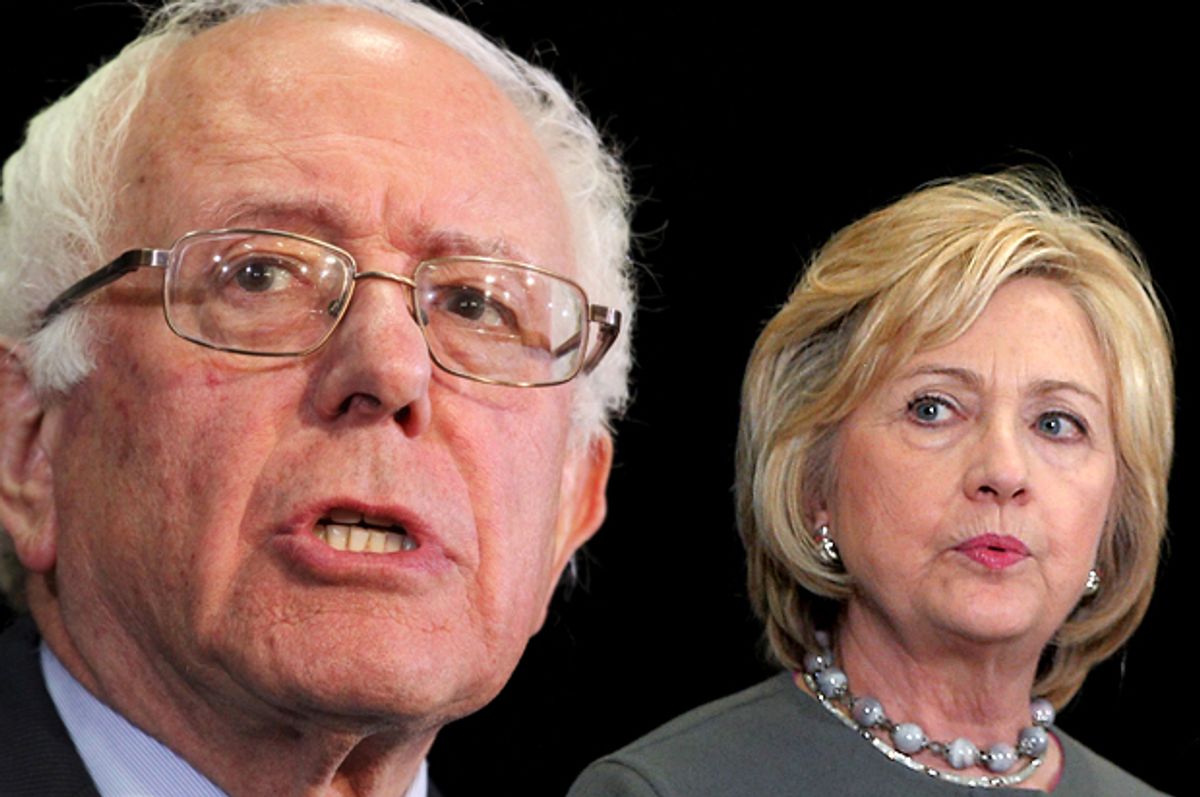Last week, Nate Cohn at the New York Times noted an important impediment to Bernie Sanders’ primary chances: his outsize reliance upon young, new voters. As Cohn explained,
[T]he race is not nearly as close among people who say they will definitely vote. The Des Moines Register/Bloomberg poll found Mrs. Clinton ahead by nine points among those who said they would “definitely” vote, with Mr. Sanders ahead by 10 among those who said they would “probably” caucus.
With the results out of Iowa a virtual tie, history afforded us something situated right between those two extremes. But the skepticism that Cohn demonstrated toward Sanders' candidacy is what matters here. Even before Obama's election in 2008, pundits questioned
Much has been made of the "demographic destiny" that Democrats enjoy, a popular theory easily expressed with the reductive formula: "lots of young progressive voters + time = win." And yet the strange and specific particulars of the last few election cycles muddied the water. Was Obama, with his soaring rhetoric, uniquely situated to draw out unprecedented numbers of young voters, or was his success the natural outgrowth of a broader impulse toward progressivism? Furthermore, was the short-lived Occupy movement a response to the financial collapse and Obama's acquiescence to Wall Street special interests, or proof of something greater, something more lasting, more transformational? Have young Americans been growing more progressive in recent years, or were they just enthralled by Obama and disillusioned with the status quo? Do they even have a coherent political philosophy?
The Pyrrhic nature of Clinton's victory in Iowa is clear evidence that the leftist shift in American politics is here to stay — and even mainstream Democrats are not safe from the rapid movement of party voters toward more nakedly social democratic systems. The breakdown between supporters of Clinton versus supporters of Sanders falls along shockingly clear generational lines, and should absolutely terrify any centrist Democrat holding national office. Among caucus-goers age 17-29, Sanders won 84-14; among those 65 and over, Clinton won 69-26. And the divide doesn't end there: Among caucus-goers age 30-44, Sanders won 58-37, whereas among those aged 45-64 the numbers were almost exactly reversed: Clinton won 58-35.
We are seeing the beginning of a massive shift in the Democratic Party, a shift that will transform American politics and put enormous pressure on our nation's already-fractious
Consider, briefly, the challenge facing Democratic National Convention chairwoman Debbie Wasserman Shultz, who is facing a primary opponent for the first time in her six terms serving in the House. Shultz is opposed by a lawyer and former Occupier named Tim Canova, an almost too-perfect avatar of the changes roiling through the party base. Here's Canova explaining to the Intercept's Glenn Greenwald what has motivated his campaign:
I’ve been a constant critic of Wall Street deregulation. I’m for Main Street; I always have been. I believe in the New Deal. I believe in bottom-up economics.
My activism has manifested itself in many ways, in many forms: certainly the anti-corporate globalization movement during the time of Seattle, against the Free Trade Area of the Americas Agreement. When I was a professor at the University of New Mexico, I threw myself into a grassroots campaign to get rid of felony disenfranchisement, and it was one of the great grassroots movements I’ve ever been involved in.
These positions (and the ideology behind them) couldn't be further from Wasserman Shultz's, and they reveal the cavernous gap that is growing between older, more moderate liberal Democrats who operate from a set of assumptions formed during their youth in the Reagan/Clinton dark ages, and younger Democrats who see the world through the lens of the Bush/Obama era's nascent-but-growing leftism.
Where do we go from here?
One of the strange byproducts of our rigidly two-party system is that the parties tend to define the limits of our ideology: individually, by setting the parameters of which causes they'll champion (and which they'll avoid), and together, by delineating the outer bounds of "serious" individuals. During the late '80s and early '90s, when the Democratic Party was facing its most profound existential crisis since the Civil War, this meant moving so far to the center as to practically eliminate left-wing politics from the national conversation altogether. Now, the tide has shifted back the other way, and business-friendly centrists like Hillary Clinton and Wasserman Shultz must look around and wonder what the hell is happening to their anodyne, moderate party.
The change has manifested so fast that it's caught a whole generation of older, moderate Democrats off guard. It's no mistake that many of the same people who were quick to question Obama's electoral viability in 2008 are casting similar criticisms at Sanders. America couldn't possibly be willing to elect a self-styled socialist to the highest political office. Right?
(And perhaps they're right to doubt Sanders' chances! That Sanders' recent success represents a massive leftward shift in the ideological preferences of young voters doesn't necessarily translate into electoral victory — even in the Democratic primary. There are, after all, plenty of older voters (le sigh). And there are plenty of good reasons to be skeptical of his chances, not least that basically every major Democratic figure has endorsed his opponent, who has a massive war chest to finance her campaign, a name synonymous with successful Democratic politics, and years of careful planning and preparation leading up to this very moment.)
It's crucial that rank-and-file Democrats, who keep hearing that Sanders isn't "electable," understand how much of the hand-wringing surrounding his candidacy is influenced by outdated assumptions about the American electorate.
And it's important for Democratic politicians to see what Sanders really is: not a kooky distraction on the path to a Hillary Clinton coronation (though that still may prove true this election cycle), but as the shape of left-wing politics to come.
Hillary Clinton may have won Monday, but the Iowa results show that candidates like Sanders will win tomorrow.


Shares